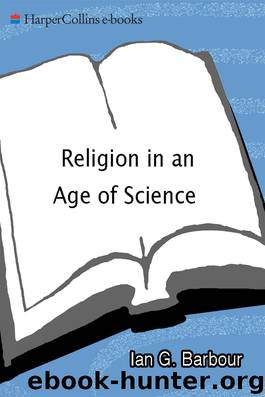Religion in an Age of Science by Ian G. Barbour

Author:Ian G. Barbour
Language: eng
Format: epub
Publisher: HarperCollins
CHAPTER 6
Evolution and Continuing Creation
The publication of Charles Darwin’s On the Origin of Species in 1859 was the most important event in an intellectual revolution that continues to affect many areas of thought. The concept of evolution has changed our understanding of nature and thereby challenged our views of humanity and our view of God’s relation to nature.
There were evolutionary ideas before Darwin, but his writings presented the first systematic theory along with extensive supporting evidence. Serving as naturalist on the HMS Beagle during a five-year voyage around the world, Darwin had observed many small variations between similar species. Six years later, reading Malthus’s essay on human populations competing for limited resources, he found the clue for a theory by which to interpret the data collected on the voyage. Two ideas were central in his theory of evolution. First, in every population there are small random variations, which can be inherited. Second, in the struggle for survival some of these variations confer a slight competitive advantage, leading over a period of many generations to the natural selection of the characteristics that contributed to survival. Darwin argued that through such natural selection new species have come into existence. In The Descent of Man (1871) he extended his theory to include human origins.
Previously it had usually been assumed that the forms of all living things were fixed when they were created. The order of nature was thought to be essentially static and unchanging. In the evolutionary view, all nature is dynamic, changing, and historical in character. Previously, humanity was sharply distinguished from the rest of nature. Since Darwin, humanity has been understood to be part of nature, the product of a common evolutionary heritage. Darwin looked on nature as a network of interacting, interdependent beings, and in this respect he can be considered a forerunner of ecology.
Darwin’s theory also represented a threefold challenge to traditional Christianity.
1. A Challenge to Biblical Literalism. A slow process of evolution cannot be reconciled with the seven-day creation in Genesis. This was not a new challenge. Earlier in the century, uniformitarian geology and the fossil evidence of extinct species had pointed to a long history of life on earth. On the other hand, symbolic rather than literal interpretations of Genesis had been defended earlier by many Christian writers, including Augustine, Luther, and Galileo. In response to Darwin, some theologians defended biblical inerrancy and rejected all forms of evolution, but they were in the minority. Most conservatives reluctantly accepted evolution (though sometimes insisting on the special creation of the human soul). The liberals, on the other hand, welcomed the growth of science and said that evolution was consistent with their optimistic view of historical progress. They were soon speaking of evolution as God’s way of creating. Most Christians were able to accommodate this challenge, though for the “scientific creationists” it is still an issue, as we have seen.
2. A Challenge to Human Dignity. Previously, human beings had been set apart from all other creatures, their unique status guaranteed by the immortality of the human soul and the distinctiveness of human rationality.
Download
This site does not store any files on its server. We only index and link to content provided by other sites. Please contact the content providers to delete copyright contents if any and email us, we'll remove relevant links or contents immediately.
The Lost Art of Listening by Michael P. Nichols(6474)
Why I Am Not A Calvinist by Dr. Peter S. Ruckman(3771)
The Rosicrucians by Christopher McIntosh(3049)
Wicca: a guide for the solitary practitioner by Scott Cunningham(2704)
Signature in the Cell: DNA and the Evidence for Intelligent Design by Stephen C. Meyer(2501)
Real Sex by Lauren F. Winner(2476)
The Holy Spirit by Billy Graham(2418)
To Light a Sacred Flame by Silver RavenWolf(2353)
The End of Faith by Sam Harris(2290)
The Gnostic Gospels by Pagels Elaine(2026)
Nine Parts of Desire by Geraldine Brooks(2007)
Waking Up by Sam Harris(1958)
Heavens on Earth by Michael Shermer(1955)
Devil, The by Almond Philip C(1899)
Jesus by Paul Johnson(1887)
The God delusion by Richard Dawkins(1848)
Kundalini by Gopi Krishna(1824)
Chosen by God by R. C. Sproul(1760)
The Nature of Consciousness by Rupert Spira(1689)
